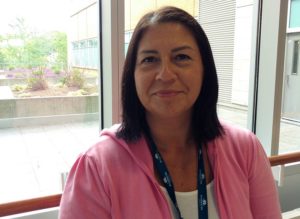Sarnia hospital welcomes First Nations patient navigator

By Colin Graf
SARNIA— First Nations patients at this city’s hospital are getting extra help sailing the waters of the local health system with the hiring of a First Nations patient “navigator”.
Nikki George, from Chippewas of Kettle and Stony Point First Nation, will help First Nations patients, caregivers and their families in moving through the health care system in a culturally safe and relevant manner, according to Bluewater Health senior nursing executive Shannon Landry.
”I feel like I’ll be that middle hub to help patients manoeuvre through the system…working with both caregivers and patients,” says George.
Removing anxiety that can cause barriers in health care is another goal for George. George has 20 years of experience in health and wellness community program planning and development with both urban and rural First Nations’ populations.
“Some First Nations people feel worried and anxious dealing with situations where the authority figures are not from their own communities,” says George. “A situation often linked to the legacy of residential schools and other colonial-era institutions such as Indian hospitals.”
“We still see our Indigenous population bringing that into the healthcare system; people still come in with some apprehension and fear and wondering what kind of treatment they’re going to get,” adds George.
“The need for someone to help guide First Nations patients in the hospital was identified in conversations with representatives from Kettle and Stony Point, Aamjiwnaang First Nation, and Bkejwanong (Walpole Island) First Nation around 2 years ago,” says nursing executive Landry.
According to Landry, comments from the three communities, patient feedback, and input from the hospital’s spiritual care staff, helped the hospital’s leadership realize that there were gaps in care and that things had to be done differently.
Landry says the hospital was not “well-attuned” to “cultural practices” such as smudging.
“Typically you don’t light fires or have smoke [in a healthcare centre],” she says. “[But] we worked very closely with people in the organization so we figured out how to do it. We have a smudging room now.”
George remembers talk when she was young about “bad experiences” with health care workers.
While she knows that there can still be negative events, George says that she is “excited to see Bluewater Health move forward. They will be leaders in this area.” George adds that not many hospitals have Indigenous navigators in place in Ontario.
George says that she will also help patients “move smoothly back home” by keeping in touch with the people caring for a discharged patient to ensure their discharge plan is adhered to.
Her first few weeks on the job have mostly been about getting to know people.
“I’m getting grounded first, within the hospital and finding out who’s who in the [First Nation] communities and how we are going to work together,” George says.
She will also be working to increase understanding among hospital staff about the unique challenges facing First Nations. Landry hopes George will help in orientation of new staff at Bluewater Health and help teach employees who are in charge of staff education, so her contributions can be passed down the line.
“A lot of people still don’t know about residential schools and Indian hospitals and how we still have people who are survivors of those institutions today,” along with the trauma passed down through generations, George says.
She feels there is a great readiness to learn at the hospital.
“People know they lack the knowledge and they want to learn. The first thing that sticks out is their willingness to learn,” claims George.
We’re really glad to see a navigator in place, says Sara Plain, Director of Health Services for Aamjiwnaang. According to Plain, community members brought up concerns they had about care at Bluewater Health and a navigator person up there would help address a lot of that.
Working with Bluewater Health has been very successful, Plain says. “They’ve been really good in developing this partnership with us.”
A committee has been formed with representation from the hospital, the three First Nations, and the Sarnia Friendship Centre that will advise George and “help create change in the hospital system to help better serve indigenous patients,” according to Plain.
“Our community welcomes Nikki George to the role of Navigator and we believe it will enhance the hospital and discharge experience for Indigenous clients throughout the county,” says Dianne George, Health Director, Kettle and Stony Point Health Services, in a hospital news release. “This is an innovative initiative and our community is looking forward to working collaboratively with the hospital and the navigator to improve the quality of care.”
“Bkejwanong welcomes the Indigenous Patient Navigator of Bluewater Health and looks forward to continuing enhanced linkages, partnerships and a culturally-safe and welcoming continuum of care between hospital and community for the benefit of Indigenous patients and families,” says Rosemary Williams, Nurse Manager at the Walpole Health Centre, in the release.
Hiring a navigator is the latest step in a plan to improve the experiences of First Nations’ communities at Bluewater Health, says Landry, pointing to the opening a year ago of a new birthing room particularly suited for First Nations. “We’re not finished, either. We want to listen to what the communities say they need next,” she says.
The birthing room features wood panelling, Indigenous art and a large sitting area to accommodate plenty of relatives during the birth and afterwards. Provisions are made in the room to allow liquid smudging and cedar baths.
“We still have a lot of work ahead of us, but it’s going to be good work, and I really feel the leadership is really positive and on-board; I can see things growing from here,” says George. “We’re hearing more positive stories than we used to. We’re going to move forward and try to make things better for Indigenous folks in the health care system.”

